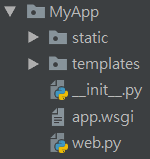Flask deploy into Apache on CentOS without Internet
Environment
- CentOS Linux release 7.5.1804 (Core)
- httpd 2.4.6 (Apache)
- Python 3.5.1
- mod_wsgi 4.6.4
Project Structure

- log: sotre apache log such as error log and access log
- static: sotre static file such as image, css, js
- templates: store html file
- web.py
from flask import Flask
app = Flask(__name__)
@app.route("/")
def hello():
return "Hello world!"
- app.wsgi
from web import app as application
Deployment Process
Install Apache and Additional Modules for Apache
$ yum install httpd
$ yum install httpd-devel
Install Required Tools
python3 requires
$ yum -y groupinstall development
pip requires
$ yum install openssl-devel
Install Python 3.5.1
$ wget -q 'https://www.python.org/ftp/python/3.5.1/Python-3.5.1.tgz'
$ tar -xzf 'Python-3.5.1.tgz'
$ cd Python-3.5.1
$ CXX=g++ ./configure --enable-shared
$ make
$ make altinstall
$ cd ..
$ rm Python-3.5.1.tgz
$ rm -rf Python-3.5.1
$ ln -fs /usr/local/bin/python3.5 /usr/bin/python3.5
$ echo "/usr/local/lib/python3.5" > /etc/ld.so.conf.d/python35.conf
$ echo "/usr/local/lib" >> /etc/ld.so.conf.d/python35.conf
$ ldconfig
Install mod_wsgi 4.6.4
$ wget -q "https://github.com/GrahamDumpleton/mod_wsgi/archive/4.6.4.tar.gz"
$ tar -xzf 'mod_wsgi-4.6.4.tar.gz'
$ cd mod_wsgi-4.6.4
$ ./configure --with-python=/usr/local/bin/python3.5
$ make
$ make install
After installing, the wsgi_module will be installed into /usr/lib64/httpd/modules/mod_wsgi.so
Create Python Virtual Environment
Switch to the path where you want to create a virtual environment.
$ cd your_venv_path
Create a virtual environment
$ python3.5 -m venv venv_name
Activate the virtual environment
$ source venv_name/bin/activate
After activating the environment
(venv_name) $
Prepare requirements.txt and Download all the Packages from your Developing Virtual Environment
get requirements.txt
(devel_venv) $ pip freeze > requirements.txt
download all the packages into your path
(devel_venv) $ pip install --download=/your/path/packages -r requirements.txt
Take requirements.txt and all the Downloaded Packages into your Deployment Server
install packages into venv of deployment server
(venv_name) $ pip install --no-index --find-links=/your/path/packages -r requirements.txt
Set Apache Configure
create a 02-wsgi.conf to load mod_wsgi into apache
$ vim /etc/httpd/conf.modules.d/02-wsgi.conf
add following command line in 02-wsgi.conf
LoadModule wsgi_module "/usr/lib64/httpd/modules/mod_wsgi.so"
create a app.conf to set your project execution environment
$ vim /etc/httpd/conf.d/app.conf
add the following content in app.conf
# define a variable which is your project path
Define PROJECT_PATH /your_project_path/MyApp
Listen 80
<virtualhost *:80>
# wsgi settings
WSGIDaemonProcess myapp python-path=${PROJECT_PATH}:/root/venv/lib/python3.5/site-packages
WSGIProcessGroup myapp
WSGIScriptAlias / ${PROJECT_PATH}/app.wsgi
# map server side static directory to {ip or domain_name}/static
Alias /static ${PROJECT_PATH}/static
# allow all requests to access this project file
<Directory ${PROJECT_PATH}/>
Require all granted
</Directory>
# set log saved path
ErrorLog ${PROJECT_PATH}/log/error.log
CustomLog ${PROJECT_PATH}/log/access.log combined
</virtualhost>
Start Apache
$ systemctl start httpd
If you encounter startup error, using following command to see startup log.
$ systemctl -l status httpd.service